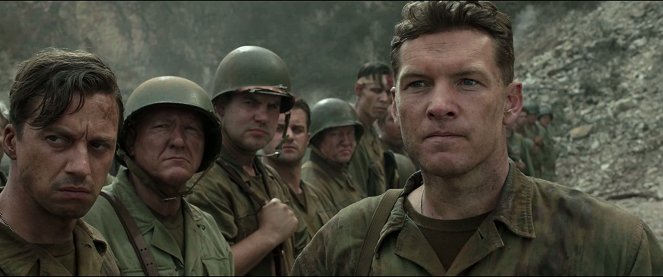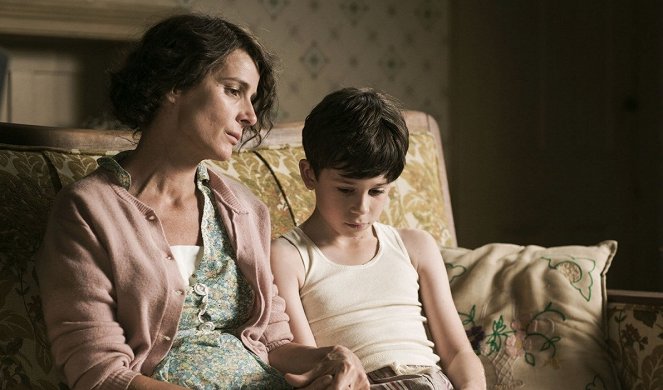Directed by:
Mel GibsonCinematography:
Simon DugganComposer:
Rupert Gregson-WilliamsCast:
Andrew Garfield, Vince Vaughn, Sam Worthington, Luke Bracey, Teresa Palmer, Hugo Weaving, Rachel Griffiths, Milo Gibson, Richard Roxburgh, Nathaniel Buzolic (more)VOD (5)
Plots(1)
Hacksaw Ridge is the epic and inspiring true story of Desmond Doss (Andrew Garfield), an army medic and conscientious objector who, during one of the bloodiest battles of World War II, saved 75 men without firing or carrying a gun. Mel Gibson directs this all star supporting cast, including Sam Worthington, Hugo Weaving, Teresa Palmer, Luke Bracey and Vince Vaughn. (Lionsgate UK)
(more)Videos (18)
Reviews (16)
Laughing in atheist Czechia at the Catholic Gibson going over the top in the story of a soldier who refuses a gun for religious reasons seems like a cheap pose to me. The truth is that just as Gibson does not discount his position as a devout Christian, he does not discount filmmaking compromises. The first hour might have deserved to be turned up a notch and let the viewer peek inside the heads of those for whom a gun is a certainty in war, but the second half is a Rambo-esque rendering plant that, with its refined camera, editing, and sound-chiseled aesthetics, turns a wartime hell into an almost hypnotically artistic experience. This was last done by Ridley Scott at the start of the new millennium. You can have whatever feelings you want about it throughout, but when Garfield's limited acting works at the end, it turns into an emotional waterfall that for once I didn’t feel awkward about. 4 ½.
()
Anachronous slag. The first third is a pure zero. Is the character demented? Does Mel like Forrest Gump, but does he not understand exaggeration? Is Vince Vaughn a perverted joke? Something so awkward belongs to the ideological enclosure of the 1990s. Fortunately, there is the second half and Call Of Duty: Holy Warfare, a dense war porn with slasher elements that constantly spoils the wild face of Garfield the cat and Mel's inclinations to burnt religious-patriotic symbolism (the verticals and ceilings, well, wow). But the naughty old man is still great at doing intestines and limbs. Everything around is nevertheless still one big loose stool. Despite the scheme, Ryan had some suitability. This is a biblical-patriotic drapery beyond the edge of endurance. That end is pure wtf. The good soldier Messi. Paraphrase of a platoon crossed with the Assumption? Give me a break. I'm not an Adventist.
()
Gibson will cut you into pieces. It starts as romantic fairytale about human values and then switches over to hell. Doss’s story begins with a very fond view of the past, growing up, a fundamental faith in God all mixed with a complicated relationship with his father (the fantastic Hugo Weaving), a veteran of the First World War and a drunk. The romantic interest is dealt with precisely, somewhere between Forrest Gump and Braveheart, which is exactly what this story needs. The training centre section was a little confused, but as soon as the platoon sets foot on Okinawa, you no longer care. No pussyfooting from Gibson, he serves us reality in its fiercest form. He presents war in a terrifying, raw and very realistic way, but the sensitivity with which it was filmed gives it a stamp of beauty. The image composition is so fantastic it’s almost unbelievable, the same as the story. Heroic transfer of Doss’s wounded comrades, saving lives¬… sometimes even Japanese, hiding in tunnels and bloodbaths. Excellent casting, dominated by Garfield (a great balance between simple farmer and an ardent believer-hero). He does the work expected from him. This movie might never have been made if it wasn’t for Gibson’s Hollywood repentance, and that would have been a great shame. Now we want him back, ready for combat, and I hope that he dusts off that Viking bloodbath that he was meant to make with DiCaprio.
()
I would divide this film into two parts like it is for instance with The Full Metal Jacket. However, as opposed to The Full Metal Jacket, the first half involving training is quite boring, but fortunately the latter half is saved by an absolute precise depiction of war that I haven’t seen in a long time. You see, war is depicted in a pretty brutal manner in this film, which is something I had expected to see in a movie directed by Mel Gibson. At times I was even remembering the brutality and efficiency of SavingPrivate Ryan. The only difference being that Hacksaw Ridge was made about twenty years later. It still is one of the best war movies of the past few years and I am glad that Mel Gibson was in charge of this one, who after all his escapades proved that he still has it in him to get famous again, which he actually managed to achieve due to the fact that he was nominated for an Oscar. By the way, try to find out something about the main character, who is portrayed here by Andrew Garfield. To be honest, I didn’t know what to think about him. I think Desmond Doss was pretty unstable psychologically, which was confirmed in the first hour of the movie. After all, the movie showed this on his despotic father and also on the fact that the entire family was part of some Adventist Church of Jesus’ Latter Days and the family really built who they were on their pacificsm. In any case, I appreciate the effort to help people. You could see that even despite his mental issues, Desmond really meant well and it’s nice that Mel Gibson made such a movie about him. The story is truly epic.
()
If the child version of Andrew Garfield had been hit in the mouth with a brick at the beginning of Hacksaw Ridge instead of his movie brother, the whole film would have made a lot more sense. I wasn’t really sure how seriously I should take a young man with the face of a divine simpleton who isn’t overly familiar with how interpersonal relationships work, let alone international politics. In any case, the film takes him seriously enough to gradually lose all credibility. Instead, it offers an enormous dose of stupidity. It seems to me that the final Assumption scene wandered into the film from an unaired Monty Python sketch. The concept that forms the basis of the entire film is reminiscent of the theatre of the absurd. To make the hero of the biggest explosion of disembowelled guts and blown-off heads since Saving Private Ryan a very devout pacifist who rejects violence of any kind strikes me as a rather cruel irony. It doesn’t seem, however, that Mel Gibson is aware of that. He doesn’t use the scenes of slaughter (which soon become numbing rather than shocking) to lead Desmond to the realisation that war is a lot more hellish than he imagined it would be (in which case the contrast of the first and second halves of the film would have worked better), but to show how hard the boy will have it if he wants to survive longer than a split second without a rifle in his hand. The creation of a hero who rejects violence is thus paradoxically conditioned by pervasive violence. If his buddies had not been torn to pieces by the bullets and grenades of the savage Japanese (an ethnic stereotype that went out of fashion along with John Wayne), he could not have become a hero. I don’t doubt that someone else will find clear logic in what I myself see as an irreconcilable contradiction, but even if it didn’t seem to me that the film is ridiculous at its very core, I would have a hard time finding reasons to recommend it to anyone as an example of the best of what has been made in Hollywood this year. We have seen powerful and generally uncluttered depictions of the pandemonium of war many times before, and the clear narrative structure and textbook segmentation, thanks to which such films never even start to be boring, are qualities that have characterised American films for many decades. Hacksaw Ridge, however, is somewhat underdeveloped both intellectually and formalistically. 60%
()



Ads